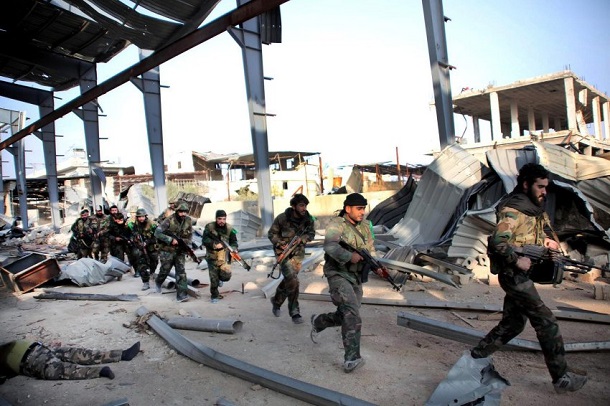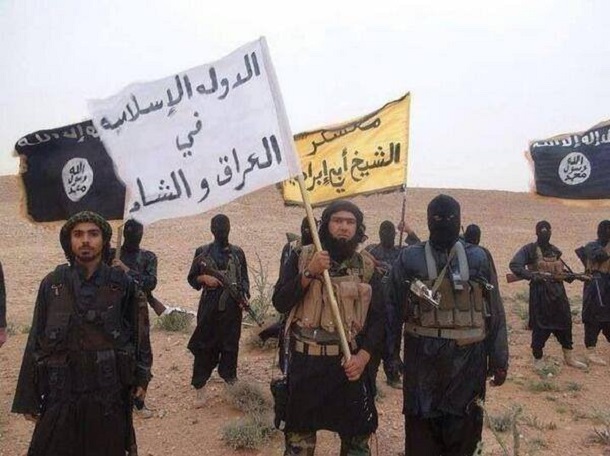Slaughterer new Islamist group called ISIS is obstructing Syrian rebels in their battle against President Bashar Assad’s regime.
The sender was unidentified, but the young engineer knew who the email was from as soon as he opened the attachment. Beneath a picture of the brutally mutilated corpse of Muhannad Halaibna, a civil rights activist known throughout the northern Syrian city of Raqqa, was a single sentence: “Are you sad now about your friend?”
Mere hours later, the engineer and 20 other members of the Syrian opposition — doctors, city council members and activists — escaped from Raqqa into Turkey. They weren’t fleeing Syrian President Bashar Assad’s regime, but a new and terrible power that has no face and goes by many names. The official name of this al-Qaida branch, which has broken away from Osama Bin Laden’s successors, is the “Islamic State of Iraq and Syria” (ISIS). “Daaisch” is the most common abbreviation of the group’s name in Syria Civil War. “But we call them the Army of Masks,” says Basil, the engineer who fled the country, “because their men rarely show their faces. They dress in black, with their faces covered.”
n addition to civil rights activist Halaibna, the group’s thugs have kidnapped hundreds of others in Raqqa, where Assad’s army was driven out back in March. The jihadists seized the chair of the city council, the heads of the civilian opposition, an Italian Jesuit and six European journalists. Anyone who opposes the ISIS fighters, or who is simply considered an unbeliever, disappears.
ISIS maintains four prisons for holding its hostages in this area alone. And Raqqa was only the beginning. In the last four months, the jihadists group, which was still essentially unknown in Syria at the start of this year, has seized control of several cities, as well as strategically important roads, oil fields and granaries.
What is currently taking place in the north and northeast of the country could bring about the worst case scenario: Syria’s disintegration. This is not because the Syrian rebels are eager al-qaida supporters as Bashar Assad’s propaganda has claimed since the spring of 2011 — but because people are exhausted after three years of destruction and don’t have much energy left to oppose the jihadists’ rapid expansion.
Syria Civil War:They War on Two Fronts
For two years, the United States and Europe’s constant mantra was to deny military support for the Syrian rebels, because there were radicals among them and weapons could fall into the wrong hands. Thus the Syrian rebels, left largely to their own devices, faced a murderous stalemate in the fight against Assad’s military machinery, which is backed by Russia and Iran.
Many voices warned against the ignorance of such policies. “The longer the outside world fails to help, the more likely it is that others will fill the gap, possibly including al-Qaida,” argued one commentary published in August 2012, titled “Civil War in Syria: The High Price of Hesitation.” Now precisely that commentary’s prediction — “confusion and delusions on the part of governments can produce exactly the thing that they wanted to prevent” — seems to have come to pass.
The balance of power among the rebels has shifted. The Free Syrian Army (FSA) has steadily shrunk while waiting in the vain hope of military aid from the US. Back when the number of foreign fighters in Syria was still very low, Washington didn’t want to support the rebels because of the possibility that al-Qaida might get involved. As a result of that inaction, al-Qaida is now there.
The rebels are being ground down by a war fought on two fronts, with Bashar al-Assad in front and the jihadists behind. To make matters worse, Washington and London now plan to discontinue their meager support of the rebels entirely.
Syria Civil War:Taking Advantage of Disorganized Free Syrian Army

With a force of around 7,000 men, in mid-September ISIS stormed the town of Azaz, in northwestern Syria. Shortly thereafter, they attacked the border town Jarabulus, 200 kilometers (125 miles) to the east, as well as the cities of Dana, Tarib, Binnish, al-Bab and even parts of Aleppo all areas that until then had been controlled by local rebels.
Hundreds of people who had managed to more or less maintain infrastructure and a justice system in these liberated areas have fled from al-Qaida to Turkey in recent months. These are the same people who were previously persecuted by the regime in Damascus.
Few dare to stand up to the masked army. When a convoy of ISIS pickup trucks mounted with machine guns rolled into the town of Turmanin in late November, not a shot was fired. The jihadists occupied the town’s largest building and set up roadblocks.
With their combination of centralized leadership, brutality and bribery, ISIS has zeroed in on the Syrian rebels’ Achilles’ heel — their lack of unity. One eyewitness says that when ISIS attacked the border town of Azaz, the leaders of the major rebel groups in northern Syria convened to discuss whether or not to help the beleaguered FSA unit there fight back.
“No,” the leader of the Tawhid Brigade the largest group in Aleppo, with around 12,000 fighters — finally decided, declaring that the group could not afford to open a second front as long as the fight against Assad required all its resources. Instead, the Tawhid Brigade’s leaders negotiated a ceasefire — which lasted only as long as it took ISIS to gather enough masked fighters to subdue the small city for good.
Syria Civil War:ISIS Attacks Intensified in Fall
The group’s forward march began quietly, a result of an internal al-Qaida power struggle. In April, Abu Bakr al-Baghdadi, head of al-Qaida in Iraq, decreed that his commands would now apply to Syria as well. The jihadists of the al-Nusra Front, whose beginnings lie somewhere in the murky depths of several attacks orchestrated by the regime, disagreed, saying they were subject only to commands issued by Ayman al-Zawahiri, official successor to Osama Bin Laden. But Zawahiri’s words, issued from the isolated mountains of western Pakistan, no longer carry much weight. Nearly all the foreign al-Nusra fighters who have infiltrated the country to date have now switched allegiances, joining al-Baghdadi’s forces.
As recently as this summer, these foreign ISIS jihadists, who travel into the country via Turkey, were just one force among many in northern Syria. The first abductions occurred, but ISIS did not yet control the roads. The foreign Islamists one met were mainly just bizarre encounters. Take the example of a scene that occurred in one of the last restaurants in the mountains of Latakia, where a group of young Saudi Arabians sat at a table. Wearing an explosive belt complete with a cable and a red plastic switch that he was toying with, one long-haired young man stood up, declaring, “If I push this, boom! Hee hee.”
These men seemed threatening, yes, but also more crazy than organized.
That changed this fall, as the ISIS units’ attacks grew appreciably more coordinated and better prepared. In Raqqa, they dealt with the small rebel groups one after another. When one FSA brigade refused to acquiesce to ISIS, the jihadists sent four suicide bombers in succession to their headquarters.
Elsewhere, the reputation ISIS had acquired in Raqqa was enough to subdue other competing rebel groups. When an ISIS convoy rolled into the city of al-Bab, the masked fighters told local rebels they only wanted to drive through the city en route to the front in Aleppo. But they had barely reached the center of town before the masked men jumped down from their pickup trucks and occupied the city center without any considerable resistance. “It was like a movie,” recalls one witness. “All these monstrous figures in black.”
[adrotate group=”12″]

